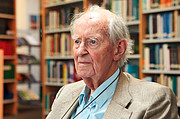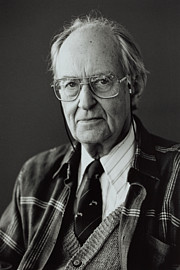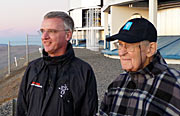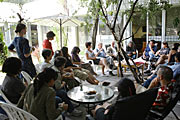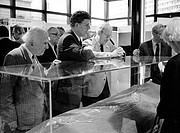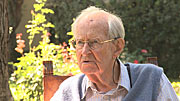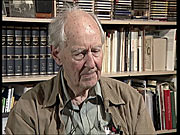Announcement
Adriaan Blaauw, 1914–2010
Dutch astronomer instrumental in the founding of ESO has passed away
2 December 2010
Professor Adriaan Blaauw, the European Southern Observatory’s second Director General, and a key figure in ESO’s early history, died yesterday, 1 December 2010, at the age of 96.
“Adriaan Blaauw was one of the most influential astronomers of the twentieth century. I had the privilege to be amongst his students when he returned to Leiden from his position as Director General. He continued to remain keenly interested in everything to do with ESO, and still had his characteristic twinkle in the eye when he visited La Silla and Paranal earlier this year. It is hard to grasp that he is no longer with us,” said ESO’s current Director General, Professor Tim de Zeeuw.
Adriaan Blaauw was born in Amsterdam, the Netherlands, in 1914. He studied astronomy at Leiden University, under de Sitter, Hertzsprung and Oort, and obtained his doctorate with van Rhijn at the Kapteyn Laboratory in Groningen in 1946, with a thesis entitled “A study of the Scorpio–Centaurus cluster”. During his career, Blaauw studied the properties of OB associations (groups of young, hot stars) which contain the fossil record of their star formation history. Perhaps his most famous work explained why some of these stars are found to be travelling unusually rapidly — so-called run-away stars. Blaauw proposed that these stars had originally been members of binary systems, but that when one star in the binary experiences a supernova explosion, its companion suddenly ceases to feel the gravitational pull that keeps it in its orbit and hence it “runs away” at its orbital velocity. This work was published in his 1961 paper “On the origin of the O- and B-type stars with high velocities (the ‘run-away’ stars), and some related problems”.
In addition to his distinguished research career, Blaauw played a central role in setting up ESO. In 1953, the astronomers Walter Baade and Jan Oort proposed the idea of pooling European resources and funding to create an astronomical research organisation that could compete on the international level. Blaauw had returned to Leiden in 1948, moved to Yerkes Observatory in 1953, becoming its associate director in 1956, and moved back to Groningen in 1957, where he was in a key position to contribute to putting the idea of Baade and Oort into practice.
ESO was founded in 1962, and Blaauw took up the position of Scientific Director in 1968 and subsequently became the organisation’s second Director General from 1970 until 1974. During that time, several telescopes including the ESO 0.5-metre and 1-metre Schmidt telescopes began operating at ESO’s first observatory site, La Silla, in Chile. This was also a key period for the design and construction of the ESO 3.6-metre telescope, which had its first light in 1976. Blaauw decided that it was crucial for this project to move ESO Headquarters from Hamburg to Geneva, to benefit from the presence of the CERN engineering group. Today, the 3.6-metre telescope remains at the forefront of research, hosting the HARPS spectrograph — the world’s foremost exoplanet hunter.
”The early years for any organisation, particularly one in which half a dozen countries and their governments are involved, can provide many challenges. But with Adriaan Blaauw’s leadership, preceded by Otto Heckmann, ESO started off on a strong footing,” said de Zeeuw.
After stepping down as Director General of ESO, Blaauw returned to Leiden, and continued to play a very important role in international astronomy. He was President of the International Astronomical Union from 1976 to 1979, during which period he managed to convince China to rejoin the IAU. Blaauw retired in 1981 and moved back to Groningen, but stayed active. He served as Chairman of the Scientific Evaluation Committee for the European Space Agency satellite Hipparcos, advising on many aspects of its scientific programme.
Blaauw was well-known for his legendary patience and wisdom, and for his genuine interest in astronomy and astronomers, including the most junior students. He liked to quietly bring order to most topics that he turned his attention to. This included the archives of ESO and of the IAU — work which resulted in two books, ESO’s Early History and History of the IAU. His personal account of his life entitled My Cruise Through the World of Astronomy, published in the 2004 Annual Reviews of Astronomy and Astrophysics, provides an extraordinarily accurate picture of a truly remarkable person, who influenced the lives of many others in a very positive way.
Links
About the Announcement
| Id: | ann1090 |
Our use of Cookies
We use cookies that are essential for accessing our websites and using our services. We also use cookies to analyse, measure and improve our websites’ performance, to enable content sharing via social media and to display media content hosted on third-party platforms.
ESO Cookies Policy
The European Organisation for Astronomical Research in the Southern Hemisphere (ESO) is the pre-eminent intergovernmental science and technology organisation in astronomy. It carries out an ambitious programme focused on the design, construction and operation of powerful ground-based observing facilities for astronomy.
This Cookies Policy is intended to provide clarity by outlining the cookies used on the ESO public websites, their functions, the options you have for controlling them, and the ways you can contact us for additional details.
What are cookies?
Cookies are small pieces of data stored on your device by websites you visit. They serve various purposes, such as remembering login credentials and preferences and enhance your browsing experience.
Categories of cookies we use
Essential cookies (always active): These cookies are strictly necessary for the proper functioning of our website. Without these cookies, the website cannot operate correctly, and certain services, such as logging in or accessing secure areas, may not be available; because they are essential for the website’s operation, they cannot be disabled.
Functional Cookies: These cookies enhance your browsing experience by enabling additional features and personalization, such as remembering your preferences and settings. While not strictly necessary for the website to function, they improve usability and convenience; these cookies are only placed if you provide your consent.
Analytics cookies: These cookies collect information about how visitors interact with our website, such as which pages are visited most often and how users navigate the site. This data helps us improve website performance, optimize content, and enhance the user experience; these cookies are only placed if you provide your consent. We use the following analytics cookies.
Matomo Cookies:
This website uses Matomo (formerly Piwik), an open source software which enables the statistical analysis of website visits. Matomo uses cookies (text files) which are saved on your computer and which allow us to analyze how you use our website. The website user information generated by the cookies will only be saved on the servers of our IT Department. We use this information to analyze www.eso.org visits and to prepare reports on website activities. These data will not be disclosed to third parties.
On behalf of ESO, Matomo will use this information for the purpose of evaluating your use of the website, compiling reports on website activity and providing other services relating to website activity and internet usage.
Matomo cookies settings:
Additional Third-party cookies on ESO websites: some of our pages display content from external providers, e.g. YouTube.
Such third-party services are outside of ESO control and may, at any time, change their terms of service, use of cookies, etc.
YouTube: Some videos on the ESO website are embedded from ESO’s official YouTube channel. We have enabled YouTube’s privacy-enhanced mode, meaning that no cookies are set unless the user actively clicks on the video to play it. Additionally, in this mode, YouTube does not store any personally identifiable cookie data for embedded video playbacks. For more details, please refer to YouTube’s embedding videos information page.
Cookies can also be classified based on the following elements.
Regarding the domain, there are:
- First-party cookies, set by the website you are currently visiting. They are stored by the same domain that you are browsing and are used to enhance your experience on that site;
- Third-party cookies, set by a domain other than the one you are currently visiting.
As for their duration, cookies can be:
- Browser-session cookies, which are deleted when the user closes the browser;
- Stored cookies, which stay on the user's device for a predetermined period of time.
How to manage cookies
Cookie settings: You can modify your cookie choices for the ESO webpages at any time by clicking on the link Cookie settings at the bottom of any page.
In your browser: If you wish to delete cookies or instruct your browser to delete or block cookies by default, please visit the help pages of your browser:
Please be aware that if you delete or decline cookies, certain functionalities of our website may be not be available and your browsing experience may be affected.
You can set most browsers to prevent any cookies being placed on your device, but you may then have to manually adjust some preferences every time you visit a site/page. And some services and functionalities may not work properly at all (e.g. profile logging-in, shop check out).
Updates to the ESO Cookies Policy
The ESO Cookies Policy may be subject to future updates, which will be made available on this page.
Additional information
For any queries related to cookies, please contact: pdprATesoDOTorg.
As ESO public webpages are managed by our Department of Communication, your questions will be dealt with the support of the said Department.

